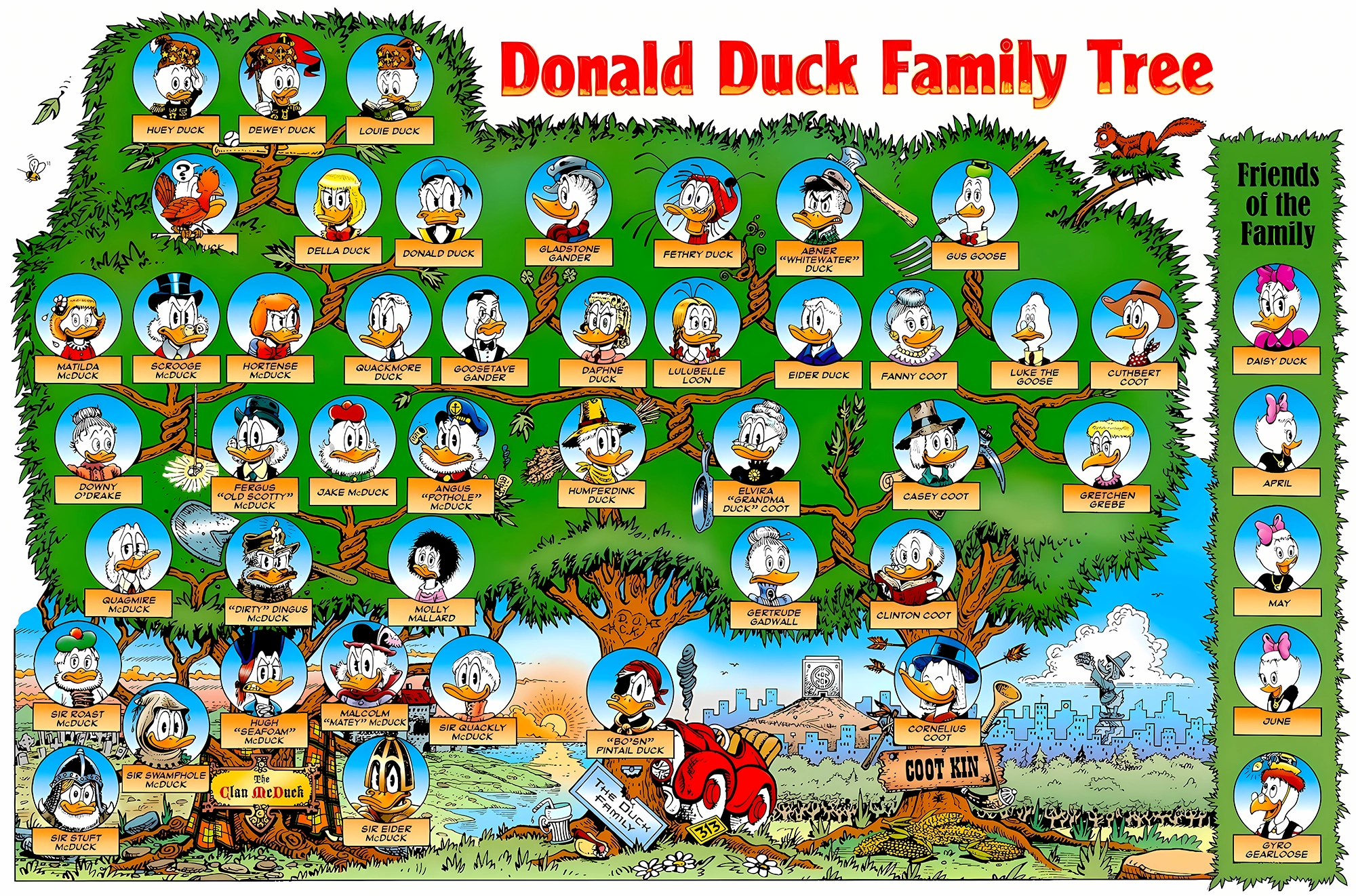
This version of the Duck family tree, including nearly all of the Duck relatives and created by Carl Barks (with the exception of Susiebelle Swan and Mehitabel Mudhen), features three main "trunks": the Clan McDuck, the Duck Family proper, and the Coot Kin. Inspired by Carl Barks's second Duck Family Tree and Mark Worden's Duck Family Tree, it incorporates characters from the latter while using the family relations from the former, with the additional change that Gus Goose's mother Fanny is, to Rosa, a niece of Elvira Duck rather than a daughter of hers.
Due to publisher interference, Fethry Duck was added to the tree despite Rosa's unwillingness to include Fethry's existence in his headcanon, while Ludwig von Drake was instead absent.
Rosa created two other Duck Family Trees. Don Rosa's Duck Family Tree Sketch is the first draft of what would become the present tree, also including birth dates and a few more characters and thoughts. Don Rosa's second Duck Family Tree is a remake of the tree, sold as a print at conventions, where Ludwig von Drake is present as Matilda McDuck's husband and Mr Duck's face is not obscured (although his name remains blank).
Additionally, Michel Nadorp's Duck Family Tree, Chris Moreno's Duck Family Tree, and Donald Duck's Big Family are all close remakes of Rosa's tree with a few details altered.

Donald Duck (or simply referred to as "The Duck"[15]) is an animated cartoon character created by Walt Disney as a foil to Mickey Mouse.[16] Making his screen debut in The Wise Little Hen on June 9, 1934, Donald is characterized as a cocky showboat with a brash and juvenile personality. He is normally depicted wearing a sailor suit, cap and a bow tie. Along with his semi-unintelligible voice (as famously created by his original voice actor, Clarence "Ducky" Nash), Donald's most dominant trait is his short temper, which is predominantly expressed through explosive tantrums and fits of quacking and squawking. Much of Donald's anger stems from his exceptionally bad luck, though his misfortunes are often the karmic result of his own arrogance and greed.
Donald garnered universal acclaim as early as his second appearance in Orphan's Benefit and quickly became a mainstay in Disney's short films thereafter. His foibles endeared him to audiences, who found the duck's attitude to be both relatable and entertaining.[17] Animators and story artists were also fond of Donald, as the character was allowed to exhibit more negative traits that couldn't be bestowed upon Mickey or the happy-go-lucky Goofy.[18] Beginning with 1937's Don Donald, Donald earned his own series of cartoons, which would introduce several recurring characters, such as his girlfriend Daisy Duck, and his nephews Huey, Dewey, and Louie.
Having starred in over 190 films, Donald has appeared in more theatrical films than any other Disney character. Several of his cartoons were honored by the Academy Awards, while other notable accolades include a star on the Hollywood Walk of Fame and cemented footprints at the Chinese Theatre. Part of Donald's widespread popularity can be attributed to his long-running comic book series under the supervision of renowned artists, such as Ted Osborne, Al Taliaferro, Carl Barks, and Don Rosa. These stories depict Donald as living in the city of Duckburg and have been enjoyed by generations of readers on a global scale.

